Business Ethics: Wonga Case Study, Regulatory Roles, and Future Ethics
VerifiedAdded on 2022/09/15
|9
|2128
|17
Essay
AI Summary
This essay critically assesses the activities and collapse of Wonga, a British payday loan provider. It analyzes the roles of regulatory bodies like the FCA, Pensions Regulator, and Bank of England, evaluating whether the situation could have been prevented. The essay applies the CII Ethical Dilemma Resolution model to assess the ethics of the scenario and reviews the social and ethical implications of the case. It further suggests recommendations for corporate managers to uphold the highest standards of integrity and ethics in all business matters. The essay highlights the importance of ethical conduct in the financial sector, emphasizing transparency, consumer protection, and the implementation of ethical codes to prevent future financial scandals. The analysis draws upon various sources to provide a comprehensive understanding of the Wonga case and its implications for the financial industry and regulatory frameworks.
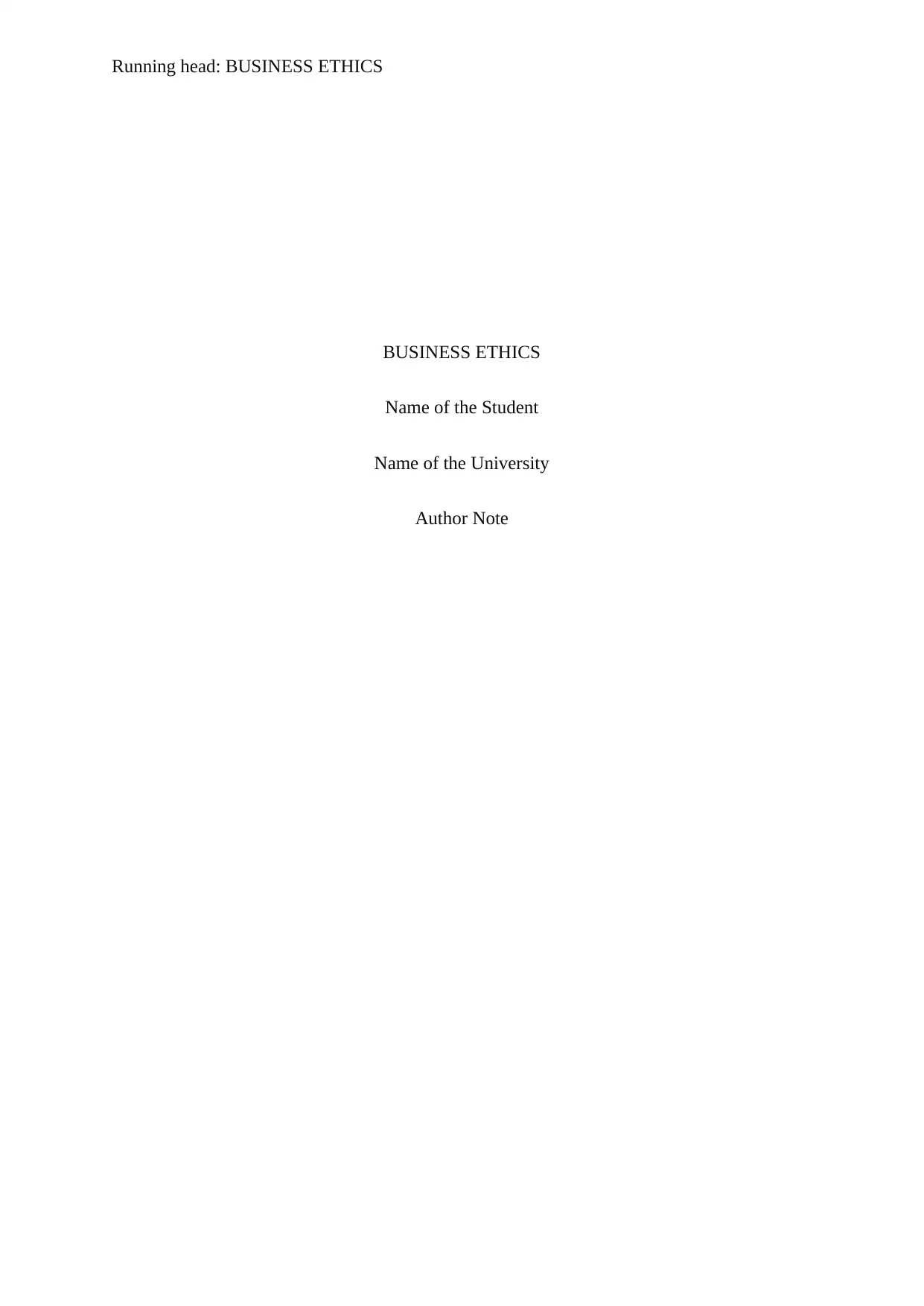
Running head: BUSINESS ETHICS
BUSINESS ETHICS
Name of the Student
Name of the University
Author Note
BUSINESS ETHICS
Name of the Student
Name of the University
Author Note
Paraphrase This Document
Need a fresh take? Get an instant paraphrase of this document with our AI Paraphraser
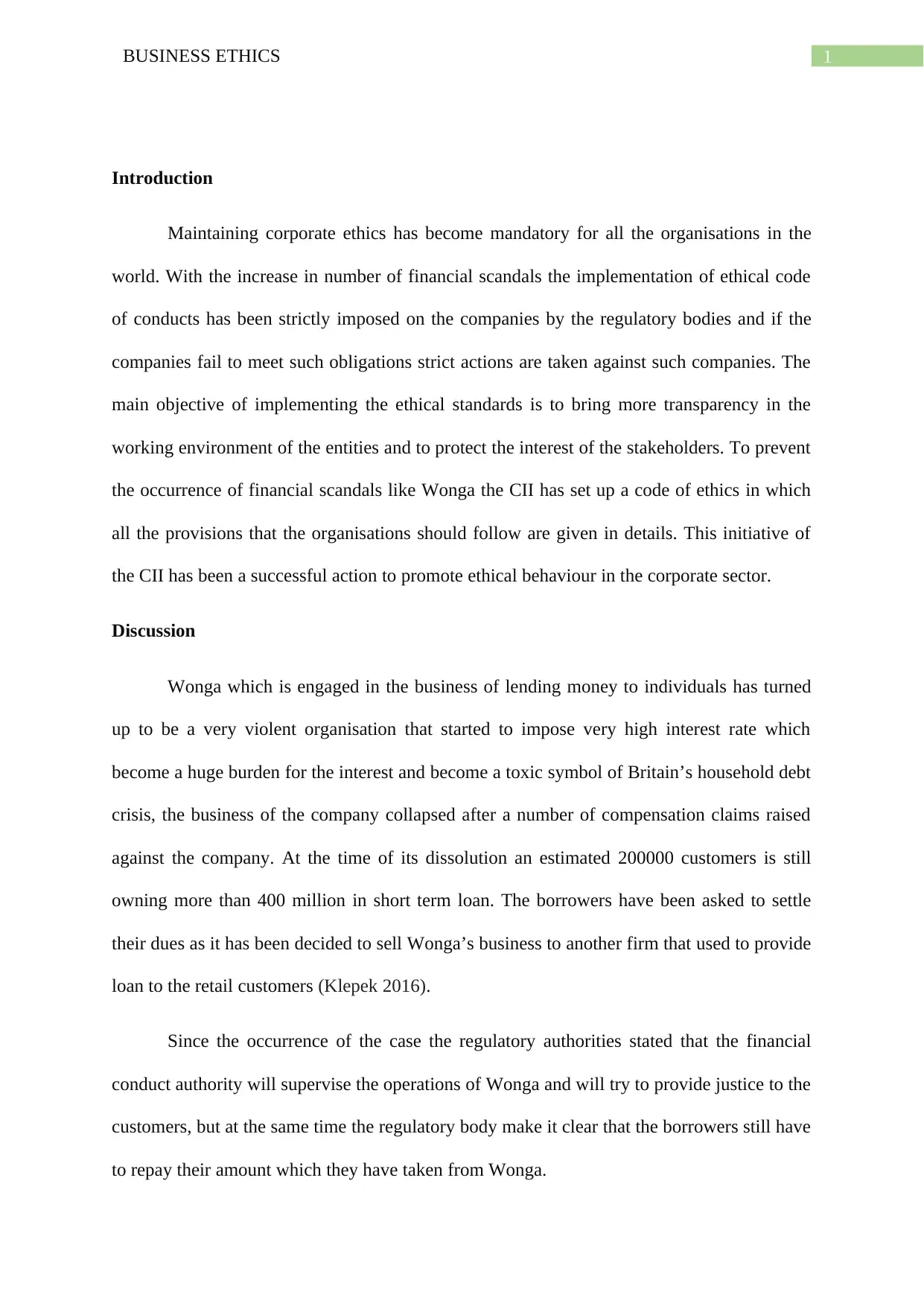
1BUSINESS ETHICS
Introduction
Maintaining corporate ethics has become mandatory for all the organisations in the
world. With the increase in number of financial scandals the implementation of ethical code
of conducts has been strictly imposed on the companies by the regulatory bodies and if the
companies fail to meet such obligations strict actions are taken against such companies. The
main objective of implementing the ethical standards is to bring more transparency in the
working environment of the entities and to protect the interest of the stakeholders. To prevent
the occurrence of financial scandals like Wonga the CII has set up a code of ethics in which
all the provisions that the organisations should follow are given in details. This initiative of
the CII has been a successful action to promote ethical behaviour in the corporate sector.
Discussion
Wonga which is engaged in the business of lending money to individuals has turned
up to be a very violent organisation that started to impose very high interest rate which
become a huge burden for the interest and become a toxic symbol of Britain’s household debt
crisis, the business of the company collapsed after a number of compensation claims raised
against the company. At the time of its dissolution an estimated 200000 customers is still
owning more than 400 million in short term loan. The borrowers have been asked to settle
their dues as it has been decided to sell Wonga’s business to another firm that used to provide
loan to the retail customers (Klepek 2016).
Since the occurrence of the case the regulatory authorities stated that the financial
conduct authority will supervise the operations of Wonga and will try to provide justice to the
customers, but at the same time the regulatory body make it clear that the borrowers still have
to repay their amount which they have taken from Wonga.
Introduction
Maintaining corporate ethics has become mandatory for all the organisations in the
world. With the increase in number of financial scandals the implementation of ethical code
of conducts has been strictly imposed on the companies by the regulatory bodies and if the
companies fail to meet such obligations strict actions are taken against such companies. The
main objective of implementing the ethical standards is to bring more transparency in the
working environment of the entities and to protect the interest of the stakeholders. To prevent
the occurrence of financial scandals like Wonga the CII has set up a code of ethics in which
all the provisions that the organisations should follow are given in details. This initiative of
the CII has been a successful action to promote ethical behaviour in the corporate sector.
Discussion
Wonga which is engaged in the business of lending money to individuals has turned
up to be a very violent organisation that started to impose very high interest rate which
become a huge burden for the interest and become a toxic symbol of Britain’s household debt
crisis, the business of the company collapsed after a number of compensation claims raised
against the company. At the time of its dissolution an estimated 200000 customers is still
owning more than 400 million in short term loan. The borrowers have been asked to settle
their dues as it has been decided to sell Wonga’s business to another firm that used to provide
loan to the retail customers (Klepek 2016).
Since the occurrence of the case the regulatory authorities stated that the financial
conduct authority will supervise the operations of Wonga and will try to provide justice to the
customers, but at the same time the regulatory body make it clear that the borrowers still have
to repay their amount which they have taken from Wonga.
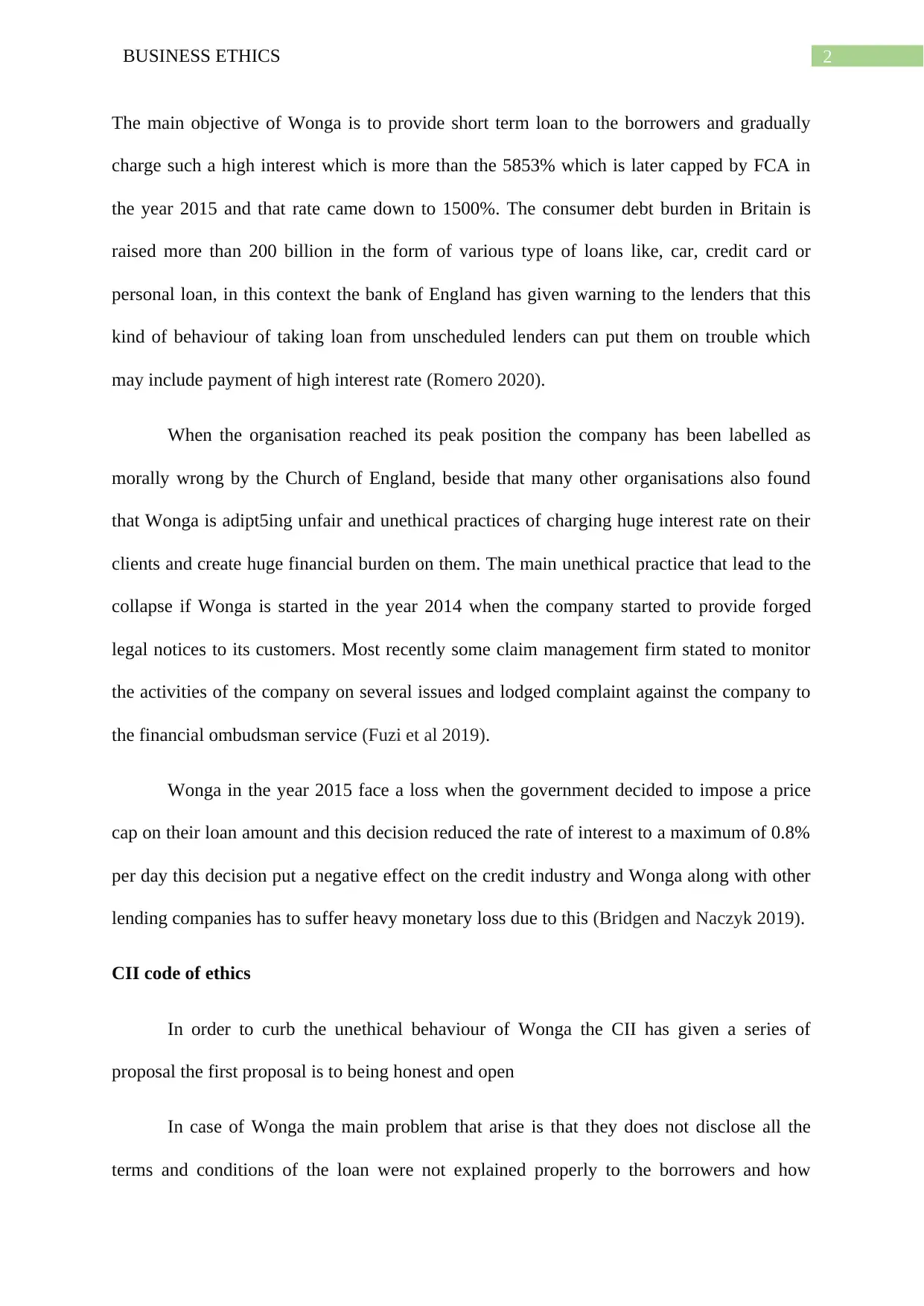
2BUSINESS ETHICS
The main objective of Wonga is to provide short term loan to the borrowers and gradually
charge such a high interest which is more than the 5853% which is later capped by FCA in
the year 2015 and that rate came down to 1500%. The consumer debt burden in Britain is
raised more than 200 billion in the form of various type of loans like, car, credit card or
personal loan, in this context the bank of England has given warning to the lenders that this
kind of behaviour of taking loan from unscheduled lenders can put them on trouble which
may include payment of high interest rate (Romero 2020).
When the organisation reached its peak position the company has been labelled as
morally wrong by the Church of England, beside that many other organisations also found
that Wonga is adipt5ing unfair and unethical practices of charging huge interest rate on their
clients and create huge financial burden on them. The main unethical practice that lead to the
collapse if Wonga is started in the year 2014 when the company started to provide forged
legal notices to its customers. Most recently some claim management firm stated to monitor
the activities of the company on several issues and lodged complaint against the company to
the financial ombudsman service (Fuzi et al 2019).
Wonga in the year 2015 face a loss when the government decided to impose a price
cap on their loan amount and this decision reduced the rate of interest to a maximum of 0.8%
per day this decision put a negative effect on the credit industry and Wonga along with other
lending companies has to suffer heavy monetary loss due to this (Bridgen and Naczyk 2019).
CII code of ethics
In order to curb the unethical behaviour of Wonga the CII has given a series of
proposal the first proposal is to being honest and open
In case of Wonga the main problem that arise is that they does not disclose all the
terms and conditions of the loan were not explained properly to the borrowers and how
The main objective of Wonga is to provide short term loan to the borrowers and gradually
charge such a high interest which is more than the 5853% which is later capped by FCA in
the year 2015 and that rate came down to 1500%. The consumer debt burden in Britain is
raised more than 200 billion in the form of various type of loans like, car, credit card or
personal loan, in this context the bank of England has given warning to the lenders that this
kind of behaviour of taking loan from unscheduled lenders can put them on trouble which
may include payment of high interest rate (Romero 2020).
When the organisation reached its peak position the company has been labelled as
morally wrong by the Church of England, beside that many other organisations also found
that Wonga is adipt5ing unfair and unethical practices of charging huge interest rate on their
clients and create huge financial burden on them. The main unethical practice that lead to the
collapse if Wonga is started in the year 2014 when the company started to provide forged
legal notices to its customers. Most recently some claim management firm stated to monitor
the activities of the company on several issues and lodged complaint against the company to
the financial ombudsman service (Fuzi et al 2019).
Wonga in the year 2015 face a loss when the government decided to impose a price
cap on their loan amount and this decision reduced the rate of interest to a maximum of 0.8%
per day this decision put a negative effect on the credit industry and Wonga along with other
lending companies has to suffer heavy monetary loss due to this (Bridgen and Naczyk 2019).
CII code of ethics
In order to curb the unethical behaviour of Wonga the CII has given a series of
proposal the first proposal is to being honest and open
In case of Wonga the main problem that arise is that they does not disclose all the
terms and conditions of the loan were not explained properly to the borrowers and how
⊘ This is a preview!⊘
Do you want full access?
Subscribe today to unlock all pages.

Trusted by 1+ million students worldwide
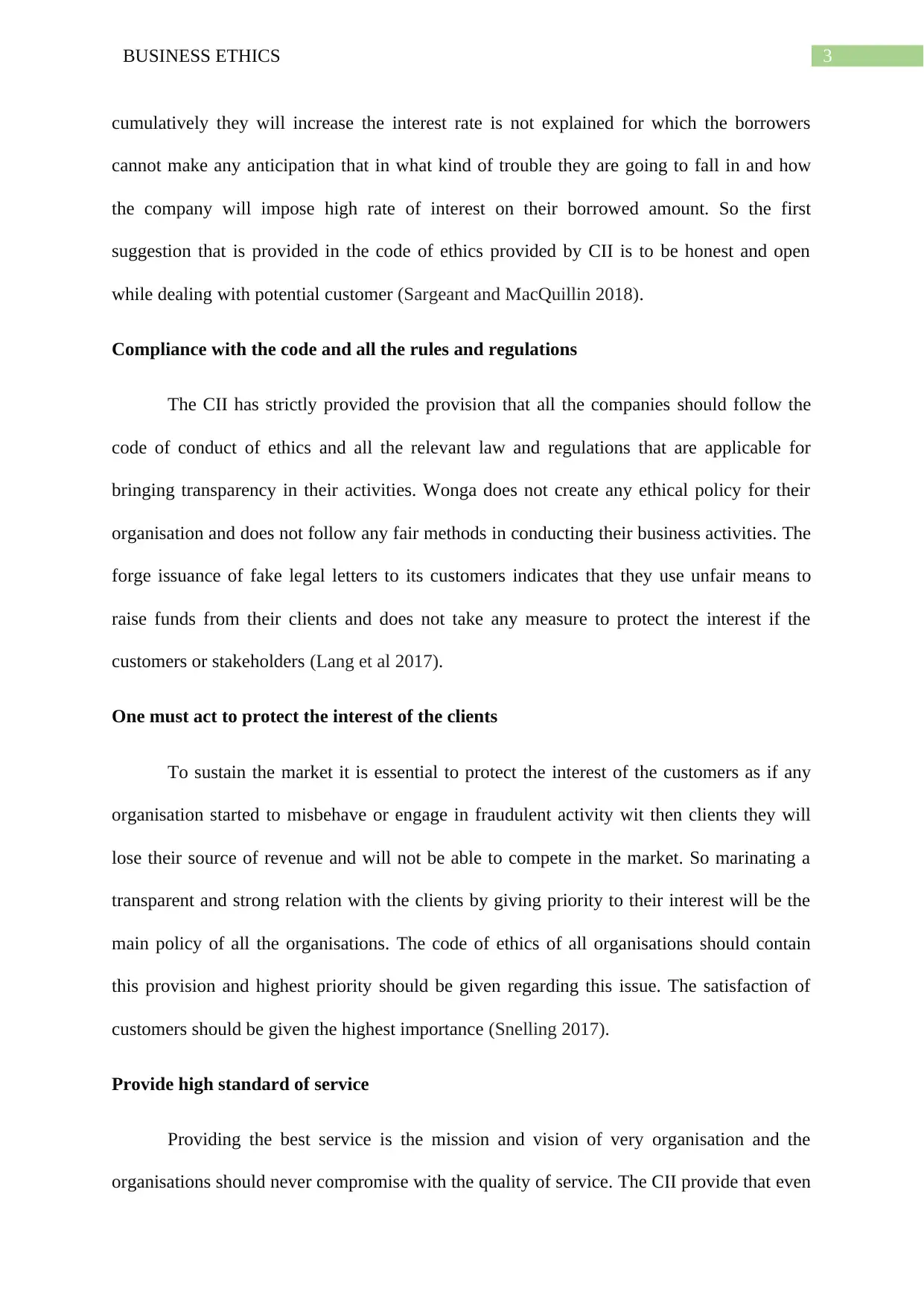
3BUSINESS ETHICS
cumulatively they will increase the interest rate is not explained for which the borrowers
cannot make any anticipation that in what kind of trouble they are going to fall in and how
the company will impose high rate of interest on their borrowed amount. So the first
suggestion that is provided in the code of ethics provided by CII is to be honest and open
while dealing with potential customer (Sargeant and MacQuillin 2018).
Compliance with the code and all the rules and regulations
The CII has strictly provided the provision that all the companies should follow the
code of conduct of ethics and all the relevant law and regulations that are applicable for
bringing transparency in their activities. Wonga does not create any ethical policy for their
organisation and does not follow any fair methods in conducting their business activities. The
forge issuance of fake legal letters to its customers indicates that they use unfair means to
raise funds from their clients and does not take any measure to protect the interest if the
customers or stakeholders (Lang et al 2017).
One must act to protect the interest of the clients
To sustain the market it is essential to protect the interest of the customers as if any
organisation started to misbehave or engage in fraudulent activity wit then clients they will
lose their source of revenue and will not be able to compete in the market. So marinating a
transparent and strong relation with the clients by giving priority to their interest will be the
main policy of all the organisations. The code of ethics of all organisations should contain
this provision and highest priority should be given regarding this issue. The satisfaction of
customers should be given the highest importance (Snelling 2017).
Provide high standard of service
Providing the best service is the mission and vision of very organisation and the
organisations should never compromise with the quality of service. The CII provide that even
cumulatively they will increase the interest rate is not explained for which the borrowers
cannot make any anticipation that in what kind of trouble they are going to fall in and how
the company will impose high rate of interest on their borrowed amount. So the first
suggestion that is provided in the code of ethics provided by CII is to be honest and open
while dealing with potential customer (Sargeant and MacQuillin 2018).
Compliance with the code and all the rules and regulations
The CII has strictly provided the provision that all the companies should follow the
code of conduct of ethics and all the relevant law and regulations that are applicable for
bringing transparency in their activities. Wonga does not create any ethical policy for their
organisation and does not follow any fair methods in conducting their business activities. The
forge issuance of fake legal letters to its customers indicates that they use unfair means to
raise funds from their clients and does not take any measure to protect the interest if the
customers or stakeholders (Lang et al 2017).
One must act to protect the interest of the clients
To sustain the market it is essential to protect the interest of the customers as if any
organisation started to misbehave or engage in fraudulent activity wit then clients they will
lose their source of revenue and will not be able to compete in the market. So marinating a
transparent and strong relation with the clients by giving priority to their interest will be the
main policy of all the organisations. The code of ethics of all organisations should contain
this provision and highest priority should be given regarding this issue. The satisfaction of
customers should be given the highest importance (Snelling 2017).
Provide high standard of service
Providing the best service is the mission and vision of very organisation and the
organisations should never compromise with the quality of service. The CII provide that even
Paraphrase This Document
Need a fresh take? Get an instant paraphrase of this document with our AI Paraphraser
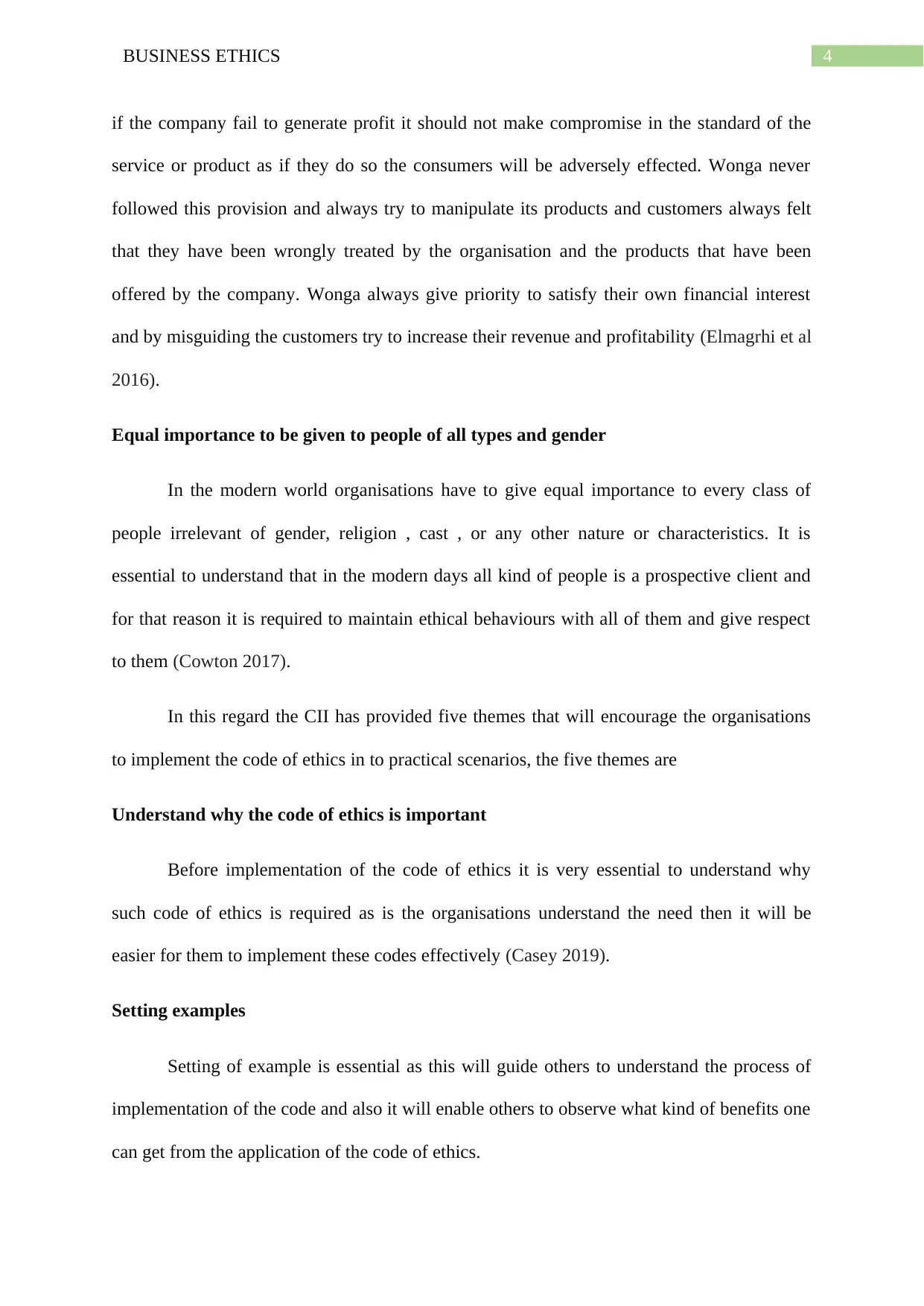
4BUSINESS ETHICS
if the company fail to generate profit it should not make compromise in the standard of the
service or product as if they do so the consumers will be adversely effected. Wonga never
followed this provision and always try to manipulate its products and customers always felt
that they have been wrongly treated by the organisation and the products that have been
offered by the company. Wonga always give priority to satisfy their own financial interest
and by misguiding the customers try to increase their revenue and profitability (Elmagrhi et al
2016).
Equal importance to be given to people of all types and gender
In the modern world organisations have to give equal importance to every class of
people irrelevant of gender, religion , cast , or any other nature or characteristics. It is
essential to understand that in the modern days all kind of people is a prospective client and
for that reason it is required to maintain ethical behaviours with all of them and give respect
to them (Cowton 2017).
In this regard the CII has provided five themes that will encourage the organisations
to implement the code of ethics in to practical scenarios, the five themes are
Understand why the code of ethics is important
Before implementation of the code of ethics it is very essential to understand why
such code of ethics is required as is the organisations understand the need then it will be
easier for them to implement these codes effectively (Casey 2019).
Setting examples
Setting of example is essential as this will guide others to understand the process of
implementation of the code and also it will enable others to observe what kind of benefits one
can get from the application of the code of ethics.
if the company fail to generate profit it should not make compromise in the standard of the
service or product as if they do so the consumers will be adversely effected. Wonga never
followed this provision and always try to manipulate its products and customers always felt
that they have been wrongly treated by the organisation and the products that have been
offered by the company. Wonga always give priority to satisfy their own financial interest
and by misguiding the customers try to increase their revenue and profitability (Elmagrhi et al
2016).
Equal importance to be given to people of all types and gender
In the modern world organisations have to give equal importance to every class of
people irrelevant of gender, religion , cast , or any other nature or characteristics. It is
essential to understand that in the modern days all kind of people is a prospective client and
for that reason it is required to maintain ethical behaviours with all of them and give respect
to them (Cowton 2017).
In this regard the CII has provided five themes that will encourage the organisations
to implement the code of ethics in to practical scenarios, the five themes are
Understand why the code of ethics is important
Before implementation of the code of ethics it is very essential to understand why
such code of ethics is required as is the organisations understand the need then it will be
easier for them to implement these codes effectively (Casey 2019).
Setting examples
Setting of example is essential as this will guide others to understand the process of
implementation of the code and also it will enable others to observe what kind of benefits one
can get from the application of the code of ethics.
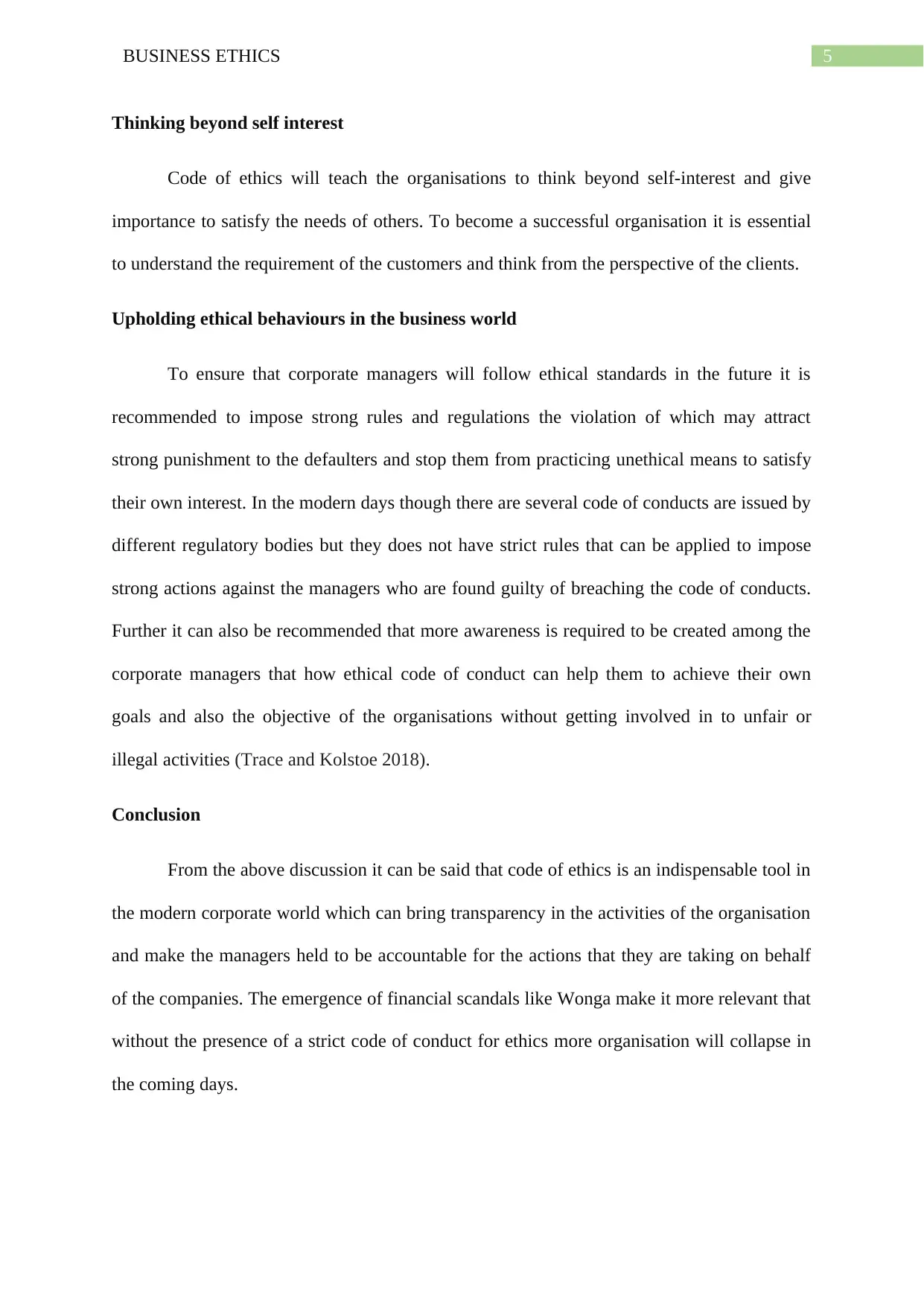
5BUSINESS ETHICS
Thinking beyond self interest
Code of ethics will teach the organisations to think beyond self-interest and give
importance to satisfy the needs of others. To become a successful organisation it is essential
to understand the requirement of the customers and think from the perspective of the clients.
Upholding ethical behaviours in the business world
To ensure that corporate managers will follow ethical standards in the future it is
recommended to impose strong rules and regulations the violation of which may attract
strong punishment to the defaulters and stop them from practicing unethical means to satisfy
their own interest. In the modern days though there are several code of conducts are issued by
different regulatory bodies but they does not have strict rules that can be applied to impose
strong actions against the managers who are found guilty of breaching the code of conducts.
Further it can also be recommended that more awareness is required to be created among the
corporate managers that how ethical code of conduct can help them to achieve their own
goals and also the objective of the organisations without getting involved in to unfair or
illegal activities (Trace and Kolstoe 2018).
Conclusion
From the above discussion it can be said that code of ethics is an indispensable tool in
the modern corporate world which can bring transparency in the activities of the organisation
and make the managers held to be accountable for the actions that they are taking on behalf
of the companies. The emergence of financial scandals like Wonga make it more relevant that
without the presence of a strict code of conduct for ethics more organisation will collapse in
the coming days.
Thinking beyond self interest
Code of ethics will teach the organisations to think beyond self-interest and give
importance to satisfy the needs of others. To become a successful organisation it is essential
to understand the requirement of the customers and think from the perspective of the clients.
Upholding ethical behaviours in the business world
To ensure that corporate managers will follow ethical standards in the future it is
recommended to impose strong rules and regulations the violation of which may attract
strong punishment to the defaulters and stop them from practicing unethical means to satisfy
their own interest. In the modern days though there are several code of conducts are issued by
different regulatory bodies but they does not have strict rules that can be applied to impose
strong actions against the managers who are found guilty of breaching the code of conducts.
Further it can also be recommended that more awareness is required to be created among the
corporate managers that how ethical code of conduct can help them to achieve their own
goals and also the objective of the organisations without getting involved in to unfair or
illegal activities (Trace and Kolstoe 2018).
Conclusion
From the above discussion it can be said that code of ethics is an indispensable tool in
the modern corporate world which can bring transparency in the activities of the organisation
and make the managers held to be accountable for the actions that they are taking on behalf
of the companies. The emergence of financial scandals like Wonga make it more relevant that
without the presence of a strict code of conduct for ethics more organisation will collapse in
the coming days.
⊘ This is a preview!⊘
Do you want full access?
Subscribe today to unlock all pages.

Trusted by 1+ million students worldwide
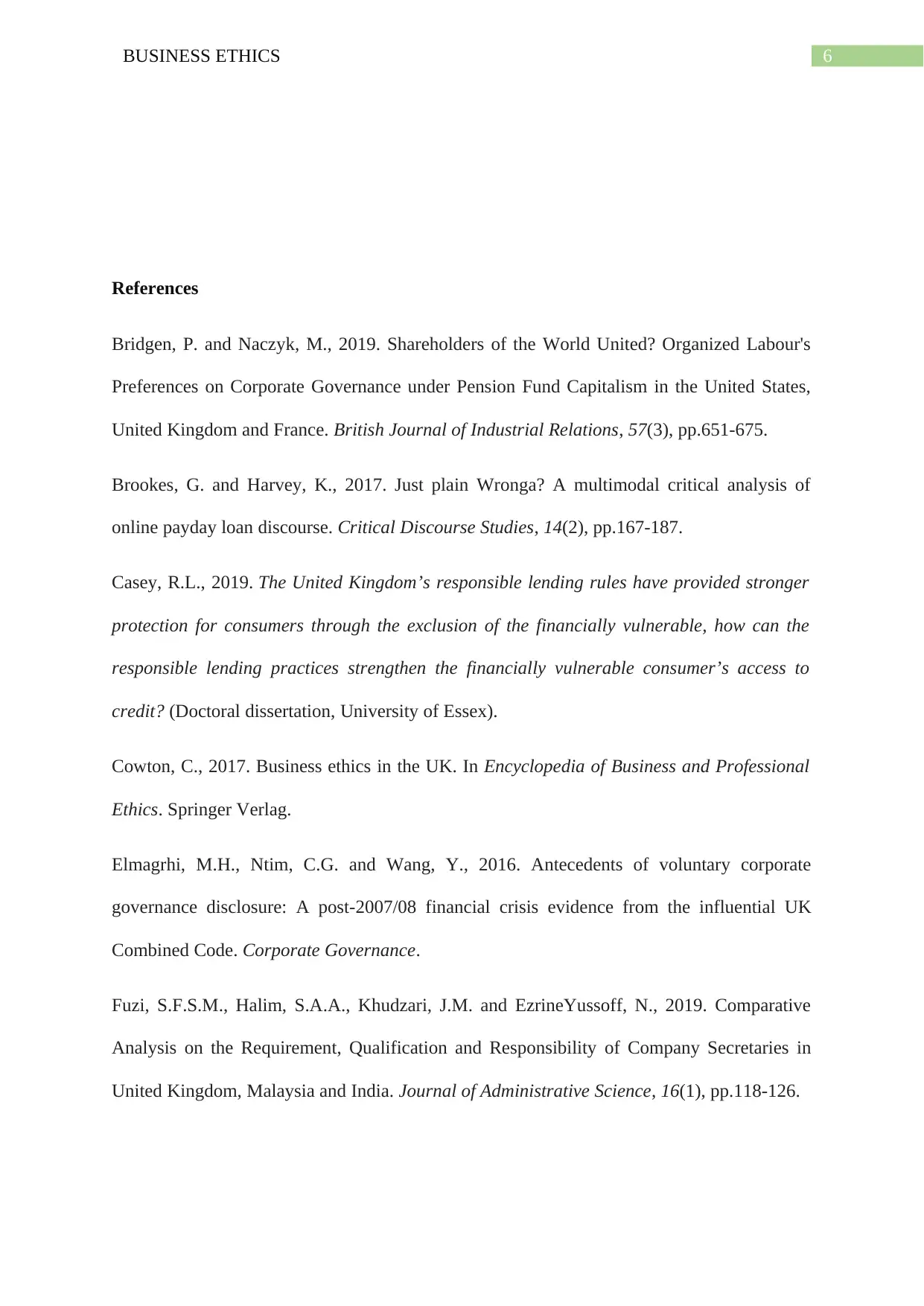
6BUSINESS ETHICS
References
Bridgen, P. and Naczyk, M., 2019. Shareholders of the World United? Organized Labour's
Preferences on Corporate Governance under Pension Fund Capitalism in the United States,
United Kingdom and France. British Journal of Industrial Relations, 57(3), pp.651-675.
Brookes, G. and Harvey, K., 2017. Just plain Wronga? A multimodal critical analysis of
online payday loan discourse. Critical Discourse Studies, 14(2), pp.167-187.
Casey, R.L., 2019. The United Kingdom’s responsible lending rules have provided stronger
protection for consumers through the exclusion of the financially vulnerable, how can the
responsible lending practices strengthen the financially vulnerable consumer’s access to
credit? (Doctoral dissertation, University of Essex).
Cowton, C., 2017. Business ethics in the UK. In Encyclopedia of Business and Professional
Ethics. Springer Verlag.
Elmagrhi, M.H., Ntim, C.G. and Wang, Y., 2016. Antecedents of voluntary corporate
governance disclosure: A post-2007/08 financial crisis evidence from the influential UK
Combined Code. Corporate Governance.
Fuzi, S.F.S.M., Halim, S.A.A., Khudzari, J.M. and EzrineYussoff, N., 2019. Comparative
Analysis on the Requirement, Qualification and Responsibility of Company Secretaries in
United Kingdom, Malaysia and India. Journal of Administrative Science, 16(1), pp.118-126.
References
Bridgen, P. and Naczyk, M., 2019. Shareholders of the World United? Organized Labour's
Preferences on Corporate Governance under Pension Fund Capitalism in the United States,
United Kingdom and France. British Journal of Industrial Relations, 57(3), pp.651-675.
Brookes, G. and Harvey, K., 2017. Just plain Wronga? A multimodal critical analysis of
online payday loan discourse. Critical Discourse Studies, 14(2), pp.167-187.
Casey, R.L., 2019. The United Kingdom’s responsible lending rules have provided stronger
protection for consumers through the exclusion of the financially vulnerable, how can the
responsible lending practices strengthen the financially vulnerable consumer’s access to
credit? (Doctoral dissertation, University of Essex).
Cowton, C., 2017. Business ethics in the UK. In Encyclopedia of Business and Professional
Ethics. Springer Verlag.
Elmagrhi, M.H., Ntim, C.G. and Wang, Y., 2016. Antecedents of voluntary corporate
governance disclosure: A post-2007/08 financial crisis evidence from the influential UK
Combined Code. Corporate Governance.
Fuzi, S.F.S.M., Halim, S.A.A., Khudzari, J.M. and EzrineYussoff, N., 2019. Comparative
Analysis on the Requirement, Qualification and Responsibility of Company Secretaries in
United Kingdom, Malaysia and India. Journal of Administrative Science, 16(1), pp.118-126.
Paraphrase This Document
Need a fresh take? Get an instant paraphrase of this document with our AI Paraphraser
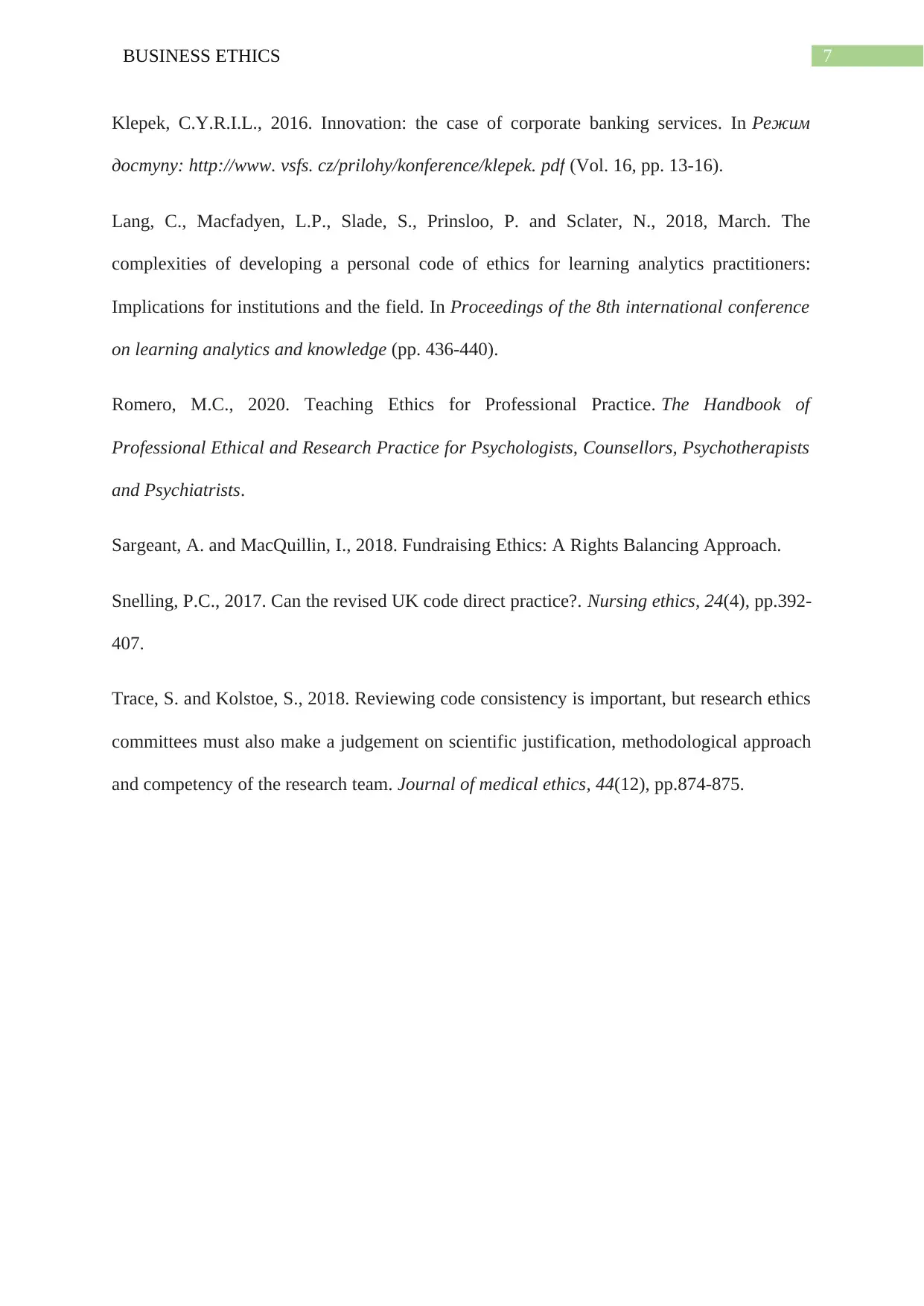
7BUSINESS ETHICS
Klepek, C.Y.R.I.L., 2016. Innovation: the case of corporate banking services. In Режим
доступу: http://www. vsfs. cz/prilohy/konference/klepek. pdf (Vol. 16, pp. 13-16).
Lang, C., Macfadyen, L.P., Slade, S., Prinsloo, P. and Sclater, N., 2018, March. The
complexities of developing a personal code of ethics for learning analytics practitioners:
Implications for institutions and the field. In Proceedings of the 8th international conference
on learning analytics and knowledge (pp. 436-440).
Romero, M.C., 2020. Teaching Ethics for Professional Practice. The Handbook of
Professional Ethical and Research Practice for Psychologists, Counsellors, Psychotherapists
and Psychiatrists.
Sargeant, A. and MacQuillin, I., 2018. Fundraising Ethics: A Rights Balancing Approach.
Snelling, P.C., 2017. Can the revised UK code direct practice?. Nursing ethics, 24(4), pp.392-
407.
Trace, S. and Kolstoe, S., 2018. Reviewing code consistency is important, but research ethics
committees must also make a judgement on scientific justification, methodological approach
and competency of the research team. Journal of medical ethics, 44(12), pp.874-875.
Klepek, C.Y.R.I.L., 2016. Innovation: the case of corporate banking services. In Режим
доступу: http://www. vsfs. cz/prilohy/konference/klepek. pdf (Vol. 16, pp. 13-16).
Lang, C., Macfadyen, L.P., Slade, S., Prinsloo, P. and Sclater, N., 2018, March. The
complexities of developing a personal code of ethics for learning analytics practitioners:
Implications for institutions and the field. In Proceedings of the 8th international conference
on learning analytics and knowledge (pp. 436-440).
Romero, M.C., 2020. Teaching Ethics for Professional Practice. The Handbook of
Professional Ethical and Research Practice for Psychologists, Counsellors, Psychotherapists
and Psychiatrists.
Sargeant, A. and MacQuillin, I., 2018. Fundraising Ethics: A Rights Balancing Approach.
Snelling, P.C., 2017. Can the revised UK code direct practice?. Nursing ethics, 24(4), pp.392-
407.
Trace, S. and Kolstoe, S., 2018. Reviewing code consistency is important, but research ethics
committees must also make a judgement on scientific justification, methodological approach
and competency of the research team. Journal of medical ethics, 44(12), pp.874-875.
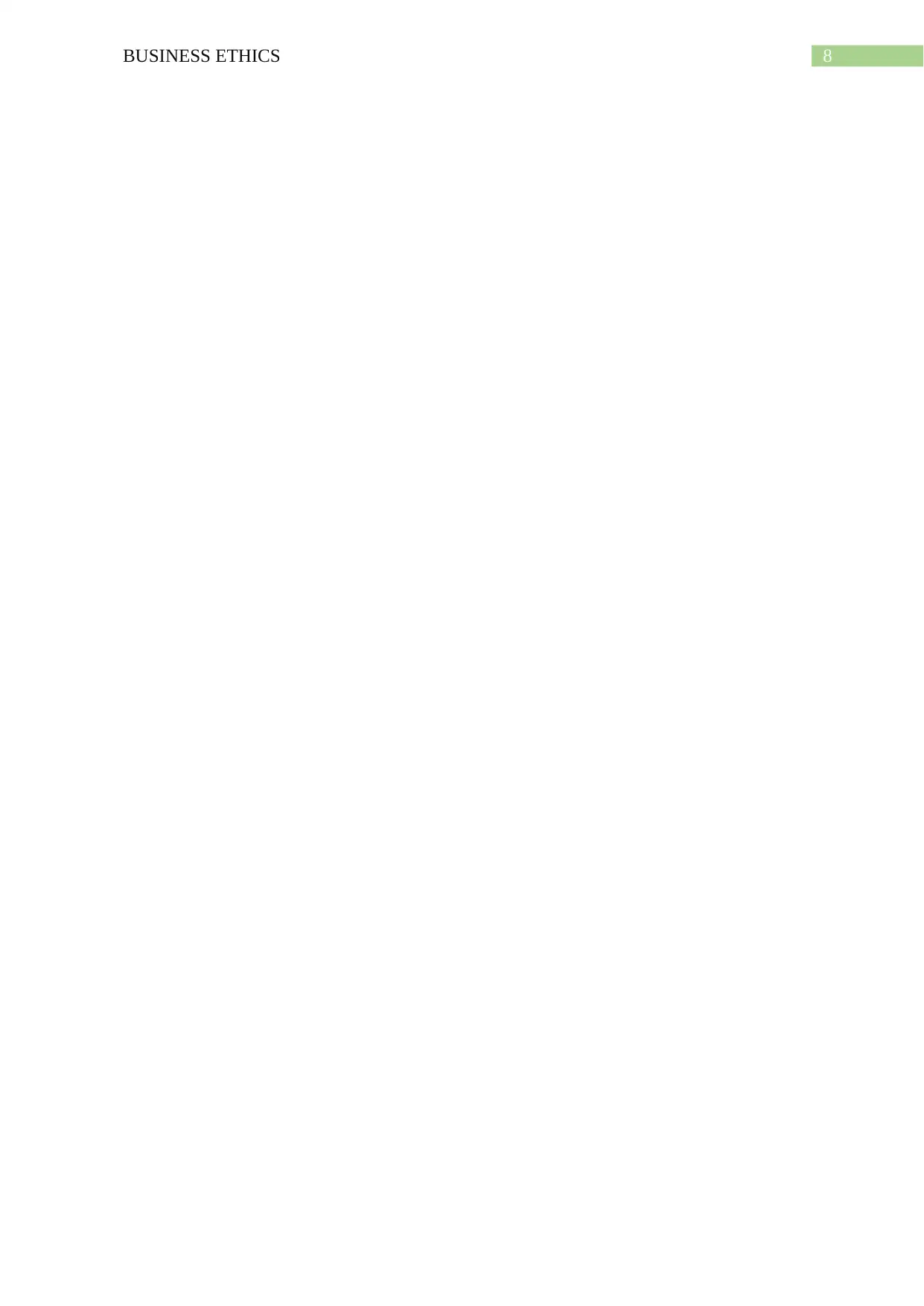
8BUSINESS ETHICS
⊘ This is a preview!⊘
Do you want full access?
Subscribe today to unlock all pages.

Trusted by 1+ million students worldwide
1 out of 9
Related Documents
Your All-in-One AI-Powered Toolkit for Academic Success.
+13062052269
info@desklib.com
Available 24*7 on WhatsApp / Email
![[object Object]](/_next/static/media/star-bottom.7253800d.svg)
Unlock your academic potential
Copyright © 2020–2026 A2Z Services. All Rights Reserved. Developed and managed by ZUCOL.





